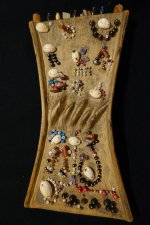The thread title asks for books we've read "lately", but I'm here to recommend a book I read decades ago. I expect scathing reviews as soon as I mention the author's name, so please read the whole post before pounding on the Reply botton!
And anyway, further discussion of this book definitely requires its own thread.
I recommend
The Sign and the Seal by Graham Hancock. It will present an interesting new perspective on the earliest history of the Jewish religion, the Knights Templar, Ethiopia and more.
Graham Hancock's career can be broken into three distinct phases:
- He was an accomplished writer of non-fiction. He worked as correspondent for The Economist and several newspapers. His books included Ethiopia: The Challenge of Hunger.
- He became obsessed with the Ethiopian legend that the Ark of the Covenant is housed today in Axum, Ethiopia. Yes, that Ark of the Covenant, allegedly containing the stone tablets on which the Finger of Yahweh had inscribed the Ten Commandments. Between 1989 and 1995 Hancock published only one book: The Sign and the Seal, a report on his investigations into the Ark of the Covenant. As an indication of this obsession, he notes on the dedication page that his (first) marriage did not survive the writing of the book.
- The Sign and the Seal became a major bestseller. Perhaps in part because he had found a path to wealth, he then authored or co-authored a number of books about lost civilizations and so on, widely derided as pseudo-science or conspiracy-theory crackpottery. Let us NOT discuss those books.
I think that
The Sign and the Seal should be judged on its own merits. Even if we stipulate that his later books were crackpottery, it doesn't follow that everything in this book is wrong. And there is much of interest in the book.
Even if you decide that EVERY hypothesis Hancock presents is false, and that his accounts of history are distorted, the book is still an interesting read! He presents a very personal narrative, e.g. about his trip through a war-zone to reach the city of Axum. And if the elaborate patterns he weaves together to support his wild hypotheses are indeed fabricated, you may still admire his handicraft at weaving these patterns!
One simple fact assures me that "scholars" have not given this book fair attention. Two on-line reviewers state that the book supports the Ethiopian myth that the Ark was brought to Ethiopia in the time of King Solomon by followers of Menelik, Solomon's son by the Queen of Sheba.
In fact Hancock specifically rejects that myth; much of the book is taken up with reasons that myth is wrong, and a very different proposal is developed with much detail and much evidence. Yet reviewers get this completely wrong! Clearly they've made no effort to even skim the book, yet are happy to pontificate about it.
Example: there was a Jewish temple on Elephantine Island near present-day Aswan. This was a rather recent discovery and should be of great interest to Jewish scholars, yet it seems almost ignored — an unsettling mystery they'd rather not think about? Yet the Elephantine temple meshes perfectly with the hypothesis Hancock constructs.
Discussion of the
 Qemant people
Qemant people and Beta Israel intrigued me and made me interested in the earliest history of the Hebrew people. There is much more of interest in Hancock's book, even if you reject his constructions as overly fanciful.

